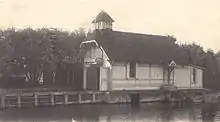Joseph Napier (USCG)
Joseph Napier, a station keeper for the United States Lifesaving Service founded the lifesaving station at St. Joseph, Michigan in 1876.[1][2][3] He operated the station for many years and was credited with many dangerous and heroic rescues.
Joseph Napier | |
|---|---|
| Service/ | United States Lifesaving Service |

Prior to joining the Life-saving service Napier was Chicago`s harbormaster, and ship's captain.[3] While in Chicago, in 1854, Napier led the rescue of the crew of a wrecked schooner, and was awarded an inscribed gold watch.[4]
The duties of a station-keeper included recruiting and training a boat crew of local volunteers, and, when vessel was a risk, to lead the boat crew in rowing to stricken vessels to rescue their crews.[1] The station-keeper and his crew were expected to try to rescue mariners even if it meant rowing into gale-force winds, shattering waves, and dangerous currents. The rescue boat would be kept on a wagon in a special boat house. During a rescue the crew would tow the wagon with the boat to the nearest relatively safe place to launch.
In one heroic rescue, on his crew's third transit to a stricken schooner, Napier was thrown overboard and seriously injured his leg.[1] He was nevertheless able to lead his crew to rescue the last two stricken seamen.
USCGC Joseph Napier
In 2010 when the Coast Guard decided that all the new Sentinel class cutters would be named after Coast Guard personnel who had been recognized for their heroism Napier was one of those to be honored.[2][5] The fifteenth cutter in the class will be named the USCGC Joseph Napier. She will be homeported in San Juan, Puerto Rico.[6]
References
-
Connie Braesch (2010-11-08). "Coast Guard Heroes: Joseph Napier". United States Coast Guard. Archived from the original on 2013-01-04.
As keeper of the Saint Joseph Life-Saving Station, Station 6, Joseph Napier demonstrated his heroism during multiple rescues as a career lifesaver on the Great Lakes. His gallantry was no more visible than on the day he risked his life and led his crew into gale-force winds to save six souls aboard a stranded vessel.
- Stephanie Young (2010-10-27). "Coast Guard Heroes". United States Coast Guard. Archived from the original on 2013-01-03. Retrieved 2012-04-20.
-
"U. S. Coast Guard Cutter Will Bear the Name of Great Lakes Sailor". Ohio`s Yesterdays. 2012-04-21. Retrieved 2013-01-10.
There, son Joseph Napier became the city’s harbormaster. In the tradition of his seafaring family, Napier built, owned, and captained Great Lakes vessels. In 1854, the citizens of Chicago presented Napier with a gold watch for leading the daring rescue of the crew of the “Merchant:” during one of the city’s most violent storms.
-
"Joseph Napier: Awarded 1 May 1878". USCG. 2012-01-26. Archived from the original on 2013-02-21. Retrieved 2013-01-10.
Most notable instance was his rescue of the crew of the schooner Merchant during a tempest in 1854. For this feat he was presented with a gold watch suitably inscribed by citizens of Chicago.
-
"FRC Plan B: The Sentinel Class". Defense Industry Daily. 2014-05-02. Archived from the original on 2014-07-07. Retrieved 2014-04-03.
All of these boats will be named after enlisted Coast Guard heroes, who distinguished themselves in USCG or military service. The first 25 have been named, but only 8 have been commissioned...
-
Rhonda Carpenter (2012-11-05). "Coast Guard Commissions Third Fast Response Cutter, William Flores". Defense Media Network. Archived from the original on 2013-01-04.
The first six FRCs for District 7 will be homeported in Miami; the next six in Key West; and the remaining six in Puerto Rico.